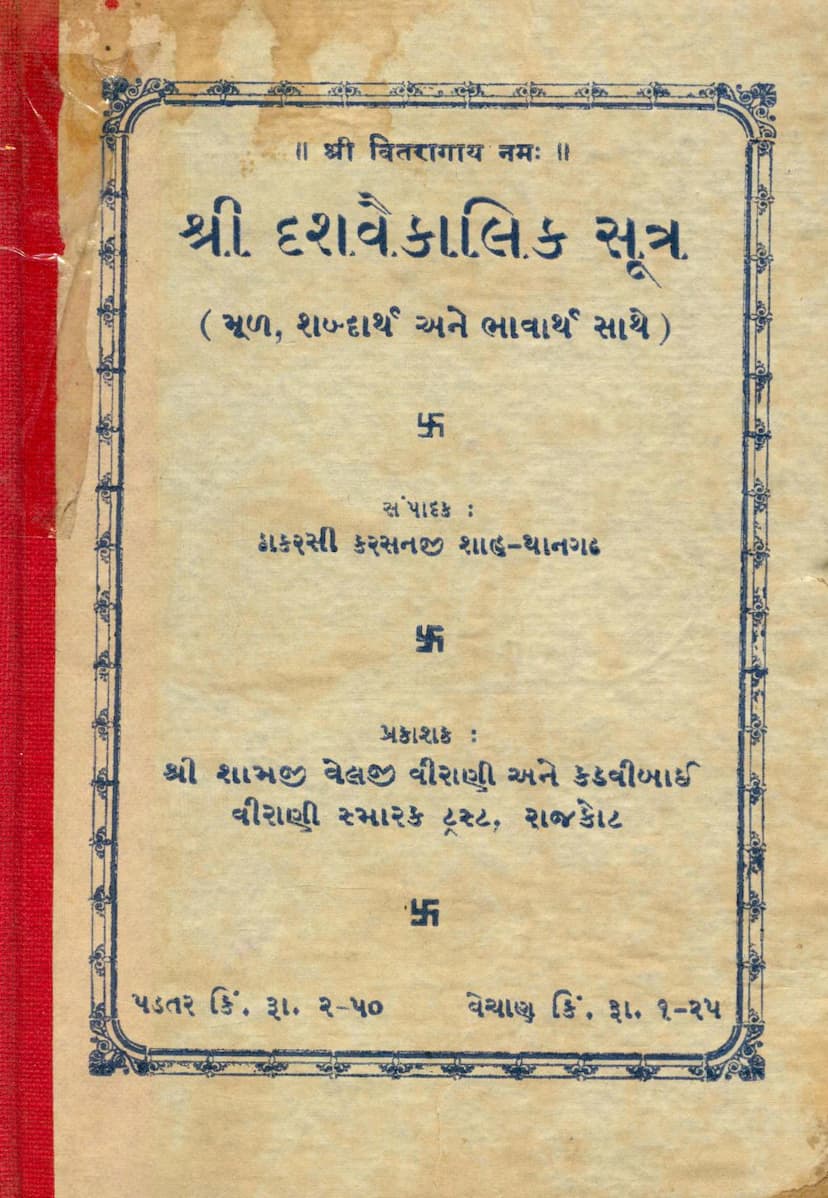Dashvaikalik Sutra
Added to library: September 1, 2025

Summary
This is a comprehensive summary of the Dashvaikalik Sutra based on the provided text.
Dashvaikalik Sutra: A Summary
The Dashvaikalik Sutra, translated and annotated by Thakarsi Karsanji Shah, is a foundational text in Jainism, published by the Shamji Velji Virani and Kadbibai Virani Memorial Trust, Rajkot. The text is dedicated to the memory of Param Vairagi Swasth B. Brahmachari Vinodmuniji, a devoted follower of Jinvani, whose life's motto was "Asankhyam jeeviyam ma pramaaya" (Life is fleeting and cannot be regained, so do not be negligent for even a moment).
Core Teachings and Structure:
The Dashvaikalik Sutra is primarily focused on Charitra (conduct or right conduct) within the Jain spiritual path. It outlines the path for ascetics (monks and nuns) and offers guidance for lay followers. The text is structured into ten chapters (Adhyayans), each delving into specific aspects of spiritual discipline and conduct.
Key Themes and Chapters:
-
Dhum Pushpika (Chapter 1: The Flower of Smoke): This introductory chapter emphasizes the supremacy of Dharma over all worldly pursuits. It highlights that true auspiciousness (mangala) comes from spiritual practices like Ahimsa (non-violence), Sanyam (restraint), and Tapa (austerity), which even deities revere. It uses the analogy of a bee collecting nectar from flowers without harming them to illustrate the ideal conduct of an ascetic.
-
Shraman Purvak (Chapter 2: Asceticism): This chapter discusses the importance of renouncing worldly pleasures and desires, particularly sensual attachments, using the story of Rathnemi and Rajimati. It stresses the need for detachment and control over the senses to progress on the spiritual path.
-
Khullakachar (Chapter 3: Minor Conduct): This chapter details various practices and prohibitions for ascetics, outlining what is considered unacceptable (akalpaniya) conduct for them. It lists specific actions and items that monks and nuns must avoid to maintain their spiritual purity and adherence to Jain principles.
-
Jeevakaya (Chapter 4: Living Beings): This chapter is a detailed explanation of the six categories of living beings (Jeeva Kaya) recognized in Jainism: Prithvi Kaya (earth), Ap Kaya (water), Teju Kaya (fire), Vayu Kaya (air), Vanaspati Kaya (plants), and Trasa Kaya (mobile beings – those with two or more senses). It emphasizes the profound importance of non-violence towards all forms of life, highlighting the interconnectedness and inherent sanctity of every living being. It details the vows taken by ascetics to protect these six life-forms.
-
Pindeshana (Chapter 5: Alms-Quest): This chapter meticulously describes the rules and ethics surrounding the ascetic's quest for alms (food and water). It emphasizes the importance of pure and mindful alms-gathering (Pindeshana), ensuring that the food is pure, collected without causing harm to any living beings, and without attachment or desire. It details how to accept or refuse food based on specific guidelines.
-
Mahachar (Chapter 6: Great Conduct): This chapter focuses on the higher principles of ascetic conduct, reinforcing the importance of the five Mahavratas (great vows) and the six essential restraints. It elaborates on the discipline required in the life of an ascetic, emphasizing self-control, non-violence, and detachment.
-
Suvakya Shuddhi (Chapter 7: Purity of Speech): This chapter stresses the ethical use of speech, guiding ascetics on what to say and what to avoid. It emphasizes truthful, non-harmful, and beneficial speech, while strongly advising against gossip, harsh words, flattery, and any speech that could lead to sin or harm to oneself or others.
-
Achar Pranidhi (Chapter 8: Vigilance in Conduct): This chapter highlights the importance of constant vigilance in all actions, thoughts, and words. It reiterates the protection of the six life-forms (Jeeva Kaya) and the significance of maintaining equanimity (Sama-bhav) in all situations, even when facing hardship or provocation.
-
Vinaya Samadhi (Chapter 9: Humility and Equanimity): This chapter underscores the critical role of Vinaya (humility, respect, and reverence), particularly towards the Guru and seniors. It explains how humility leads to spiritual progress, knowledge, and ultimately, Samadhi (mental composure and tranquility). It details the negative consequences of pride and disrespect, leading to spiritual downfall.
-
Sachitta-Vivajjan (Chapter 10: Avoidance of Living Matter): This chapter, the last of the Dashvaikalik Sutra, reiterates the profound Jain principle of avoiding harm to living beings. It emphasizes the strictness required in ascetic life, particularly concerning the consumption and use of food and other items that are connected to living organisms, stressing the need for utmost care and vigilance.
Overall Message:
The Dashvaikalik Sutra provides a practical and ethical guide for ascetics, emphasizing the path of Charitra as essential for spiritual liberation. It underscores the principles of:
- Ahimsa (Non-violence): Towards all six categories of living beings.
- Sanyam (Restraint): Control over senses, mind, speech, and body.
- Tapa (Austerity): Practicing self-discipline and enduring hardships for spiritual purification.
- Aparigraha (Non-possession): Detachment from worldly possessions and desires.
- Vinaya (Humility): Reverence towards Gurus and the teachings.
- Sama (Equanimity): Maintaining mental balance in all circumstances.
The text aims to guide the practitioner towards self-realization and ultimately, Moksha (liberation), by meticulously detailing the conduct required for a pure and disciplined spiritual life. The edition includes the original text, word-meaning, and commentary (Bhavartha), making it accessible for study and practice.